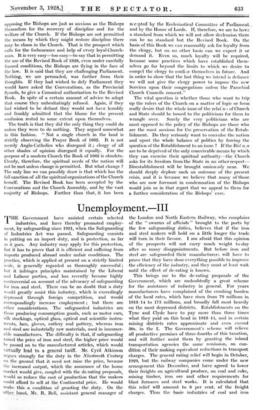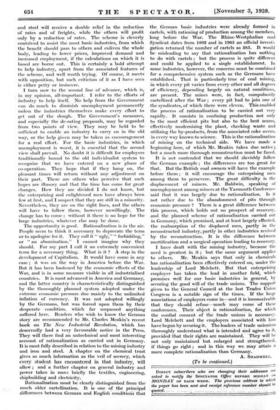Unemployment. III
THE Government have assisted certain selected industries, and have thereby promoted employ- ment, by safeguarding since 1921, when the Safeguarding of Industries Act was passed. Safeguarding consists in putting on an import duty, and is protection, as far as it goes. Any industry may apply for this protection, but it has to prOve that it is efficient and suffering from imports produced abroad under unfair conditions. The practice, which is applied at present on a strictly limited scale, is generally regarded as thoroughly successful ; but it infringes principles maintained by the Liberal and Labour parties, and has recently become highly controversial on account of the advocacy of safeguarding for iron and steel. There can be no doubt that a duty would greatly assist this industry, which is exceedingly depressed through foreign competition, and would correspondingly increase employment ; but there are other considerations. The safeguarded industries are those producing consumption goods, such as motor cars, silk stockings, optical glass, optical and scientific instru- ments, lace, gloves, cutlery and pottery, whereas iron and steel are industrially raw materials, used in innumer- able manufactures. The difficulty is that, if safeguarding raised the price of iron and steel, the higher price would be passed on to the manufactured articles, which would virtually lead to a general tariff. 'Mr. Cyril Atkinson argues strongly for the duty in the Nineteenth Century on the ground that it need not raise the price, because the increased output, which the assurance of the home market would give, coupled with the de-rating proposals, would so reduce the cost of production that the makers could afford to sell at the Continental price. He would make this.. a coadition of granting the . duty. On the other hand Mr. R. Bell, assistant general manager of the London and North Eastern Railway, who complains of the " swarms of officials " brought to the ports by the few safeguarding duties, believes that if the iron and steel makers will hold on a little longer the trade will turn in their favour. I am afraid that this opinion of the prospects will not carry much weight to-day after so many disappointments. But before iron and steel are safeguarded their manufacturers will have to prove that they have done everything possible to improve the efficiency of the industry, and they must at least wait until the effect of de-rating is known.
This brings me to the de-rating proposals of the Government, which are undoubtedly a great scheme for the assistance of industry in general. For years manufacturers have complained of the crushing burden of the local rates, which have risen from 79 millions in 1918-14 to 175 millions, and broadly fall most heavily on the most depressed districts. Establishments on the Tyne and Clyde have to pay more than three times what they paid on this head in 1918-14, and in certain mining districts rates approximate and even exceed 80s. in the The Government's scheme will relieve all productive premises of three-fourths of this taxation, and will further assist them by granting the inland transportation agencies the same remission, on con- dition of their making equivalent reductions in transport charges. The general rating relief will begin in October, 1929, but the railway companies come under the new arrangement this December, and have agreed to lower their freights on agricultural produce, on coal and coke, mining timber, iron ore and other requirements for blast furnaces and steel works. It is calculated that this relief will amount to 8 per cent. of the freight charges. Thus the basic industries of coal and iron and steel will receive a double relief in the reduction of rates and of freights, while the others will profit only by a reduction of rates. The scheme is cleverly contrived to assist the most basic industries, from which the benefit should pass to others and enliven the whole body, leading to lower prices, improved demand and increased employment, if the calculations on which it is based are borne out. This is certainly a bold attempt to help industry, apart from the associated features of the scheme, and well worth trying. Of course, it meets with opposition, but such criticism of it as I have seen is either petty or insincere.
• I turn now to the second line of advance, which is, in my. opinion, all-important. I refer to the efforts of industry to help itself. No help from the Government can do much to diminish unemployment permanently unless the industries themselves make every effort to get out of the slough. The Government's measures, and especially the de-rating proposals, may be regarded from two points of view. They may be held to be Sufficient to enable an industry to carry on in the old way, or the help given may be taken as encOuragement for a real effort. For the basic industries, in which unemployment is worst, it is essential that the second view shall prevail. No doubt it is difficult for employers traditionally bound to the old individualist system to recognize that we have entered on a new phase of co-operation. They hope that if they hang on, the pleasant times will return without any adjustment on their part. There are others who perceive that such hopes arc illusory and that the time has come for great -changes. How they are divided I do not know, but the enterprising and enlightened men have always been few at first, and I suspect that they are still in a minority. Nevertheless, they are on the right lines, and the others will have to follow them, however unwillingly. The change has to come ; without it there is no hope for the large industries, whatever else may be done.
The opportunity is good. Rationalization is in the air. People seem to think it necessary to deprecate the term or to apologize for it. They call it " ugly," " forbidding," or " an abomination." I cannot imagine why they should. For my part I call it an extremely convenient term for a necessary thing. What is it ? A step in the development of Capitalism. It would have come in any case ; it was on the way in America before the War. But it has been hastened by the economic effects of the War, and is in some measure visible in all industrialized countries. It is most advanced in America and Germany, and the latter country is characteristically distinguished by the thoroughly planned system adopted under the extreme economic pressure due mainly to the unlimited inflation of currency. It was not adopted willingly by the Germans, but was forced upon them by their desperate condition, which far surpassed anything suffered here. Readers who wish to know the German story are recommended. to Mr. Charles Meakin's recent book on The New Industrial Revolution, which has deservedly had a very favourable notice in the Press. They will there find an untechnical and most interesting account of rationalization as carried out in Germany.
• It is most fully described in relation to the mining industry and iron and steel. A chapter on the chemical trust gives as much information as the veil of secrecy, which every student has encountered in that industry, will allow ; and a further chapter on general industry and power takes in more briefly the textiles, engineering, shipbuilding and electricity.
Rationalization must be clearly distinguished from the much older cartellization. It is one of the principal diffekences between German and English cOnditimis that the German basic industries were already formed in cartels, with rationing of production among- the members, long before the War. The Rhine-Westphalian coal Syndicat dates from 1893 and in 1905 an official investi- gation returned the number of cartels as 885. It would be misleading to say that rationalization has nothing to do with cartels ; but the process is quite different and could be applied to a single establishment. In some industries, however, the concerns must be combined for a comprehensive system such as the Germans have established. That is particularly true of coal mining, in which every pit varies from every other and all degrees of efficiency, depending largely on natural conditions, are present. The mines were, in fact, compulsorily cartellized after the War ; every pit had to join one of the syndicates, of which there were eleven. This enabled the process of rationalization to be carried out very rapidly. It consists in confining production not only to the most efficient pits but also to the best seams, effectively modernizing the plant, checking waste and utilizing the by-products, from the associated coke ovens, in every way known to science. This is the rationalization of mining on the technical side. We have made a beginning here, of which Mr. Meakin takes due notice ; but a much more thorough reconstruction must be faced.
It is not contended that we should slavishly follow the German example ; the differences are too great for that. But the British coal owners will have the example before them ; " it will encourage the enterprising men among them to persevere. The great difficulty is the displacement of miners. Mr. Baldwin, speaking of unemployment among miners at the Yarmouth Conference Said that it was largely due to rationalization. Is it not rather due to the abandonment of pits through economic pressure ? There is a great difference between this process, which holds out no prospect of recovery, and the planned scheme of rationalization carried out in Germany, which promised, and at least largely effected, the reabsorption of the displaced men, partly in the reconstructed industry, partly in other industries revived by the reconstruction. It is the difference between mortification and a surgical operation leading to recovery.
I have dealt with the mining industry, because the need is greatest in it ; but the same argument applies to others. Mr. Meakin says that only in chemicals has rationalization been effectively entered on, under the leadership of Lord Melchett. But that enterprising employer has taken the lead in another field, which promises well for our basic industries in general, by securing the good will of the trade unions. The support given to the General Council at the last Trades Union Congress is a notable sign of the times. If the large associations of employers come in—and it is inconceivable that they should refuse—much may come of these conferences. Their object is rationalization, for which the cordial consent of the trade unions is necessary. Lord Melchett and the employers associated with him have begun by securing it. The leaders of trade unionism thoroughly understand what is intended and agree to it, provided that their rights are maintained. They will be not only maintained but enlarged and strengthened, if things go right ; and in this way we may attain a more complete rationalization than Germany.



















































































































 Previous page
Previous page